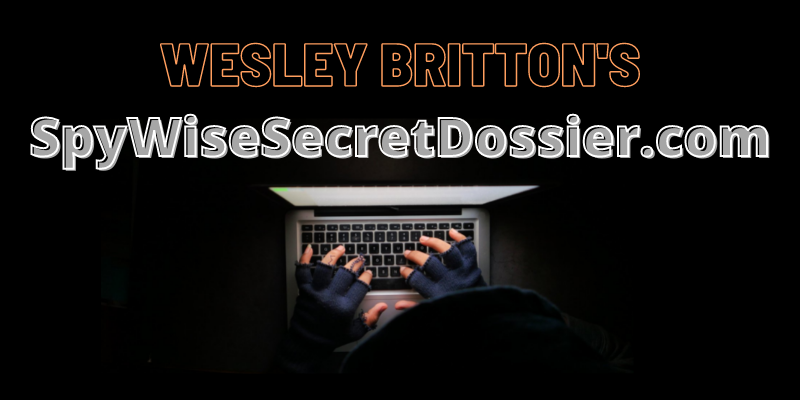
HOMEWesley Britton’s Books,
|
Spies on FilmSpies on Television & RadioSpies in History & LiteratureThe James Bond Files |
|
Spies on Television & Radio ~ He Kept 86 in Control –
An Interview with Get Smart Writer Whitey Mitchell
By Wesley Britton 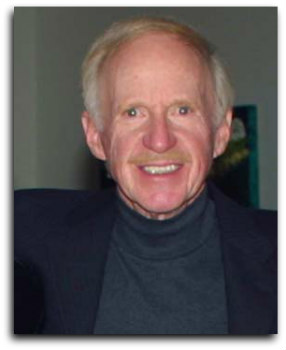
Gordon “Whitey” Mitchell The birth of Get Smart is, of course, a story well-known in TV Lore. In brief, it was Daniel Melnick’s idea to do a James Bond spoof, a premise he sold to his partners, Leonard Stern and David Susskind at Talent Associates. Melnick brought in comic writers Mel Brooks and Buck Henry to draft the first script, which they pitched to ABC. After reading their pilot script, ABC rejected the series saying it was too un-American and not funny. Talent took the concept to NBC which, at the last minute, added the series to their fall 1965 line-up. The perfect cast, popular catch-phrases, and iconic images like the shoe-phone and Cone of Silence were immediate hits, and Get Smart became one of the most enduring and beloved situation-comedies ever produced. As the years went by, many of the original creators moved on to other projects, most famously Mel Brooks and Buck Henry finding success writing for the big screen. New producers and writers kept the show alive, and among them was the new team of comedy writers Gordon “Whitey” Mitchell and Lloyd Turner. In 1968, they weren’t yet well-known for their scripts, but their work for Get Smart would lead into long careers in television. They would end up contributing stories for series like The Jeffersons, Mork and Mindy, Good Times, The Partridge Family, The Odd Couple, Mary Tyler Moore, Diff’rent Strokes – to name but a very few. In 2008, Whitey Mitchell published his memoirs, Hackensack to Hollywood: My Two Show Business Careers (BearManor Media), which not only describes his years writing for television, but also his distinguished history as a jazz musician. (He played bass for the likes of Gene Krupa, Kai Winding, Herbie Mann, and Benny Goodman. Among his rock credits, he’s the bass player on Ben E. King’s 1961 “Stand By Me.”) We decided to ask him for some of his memories working for Get Smart, especially since the production of the final seasons of the show haven’t gotten the same attention as the formative years. We were able to but scratch the surface – and hope this interview whets your appetite for more stories available in his excellent book. 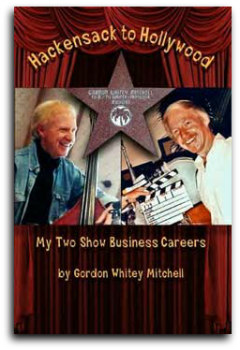 Q – How does a jazz musician move into the realm of writing television comedy? I didn’t know I’d be good at writing TV comedy scripts, but I wrote a funny article in Down Beat that generated letters to the editor, one of which came from Lenny Bruce, who called me “a brilliant writer” and the idea of becoming a writer germinated for a couple of years. Then one day, in the orchestra pit of the Mark Hellinger Theater, I had an epiphany. I was a thirty-three-year old musician and everybody else was about eighty-five and we were all making the same check and it scared the bejesus out of me. I moved to the coast a few months later. Q – How did you connect with the Get Smart writing team? Through Chris Hayward (whom I knew from the music business . . . he used to come to the clubs where I was playing) and Allan Burns, both of whom were fellow workers with my partner Lloyd Turner at the Jay Ward studio (Bullwinkle, Super Chicken, George of the Jungle, etc.) and who were Story Editors on the fourth season of Get Smart. Lloyd and I were not given an episode, but were invited to come up with story ideas and come pitch them. They loved an idea we had involving CONTROL developing a substance which could bend light rays and enable a person to become invisible. But, of course it was brand new and very unreliable, which could lead to lots of physical comedy for the star – not a bad idea. They gave us an assignment which became an episode called “One Nation Invisible,” which turned out to be very funny. They wanted us to do another one right away which became “Leadside,” and when that turned out funny, they promised that the next season (if there was a next season) they’d be Producers and we’d be Story Editors. Q – How would you describe your writing partnership with Lloyd Turner? I think Lloyd and I made a good team because we both had a good sense of humor and a sense of the ridiculous. Lloyd, with his background of working for Jay Ward, thought like a cartoonist, very visually, and it was something I hope I picked up. Humor for the eye. I was good at word humor and story construction and logic, if that ever came to bat . . . and it seldom did. Q – In total, you wrote 11 Get Smart scripts and were a “Story Consultant” for 17 more. What exactly is a “Story Consultant”? Story Consultant, Story Editor, Script Supervisor, and other similar titles are all euphemisms for Head Writer. That means, you meet with outside writers, try to develop ideas they bring with them into episodes, guide them through the process, and, if they get an assignment from the producers, give them notes on their first draft, and re-write their final draft until the producers are happy. Plus (at least in our case) come up with original episodes while working on everybody else’s script. We wrote nine originals the last year of Get Smart (including one freebee, credited to a member of Don Adams’ family who provided us with three pages of mish-mosh written in long hand with nothing that could be used. We didn’t know it when we accepted the job . . . but that was a traditional part of it. 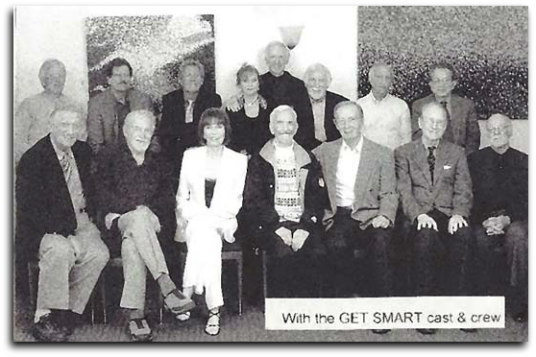
Back row – Unidentified staff member, unidentified stuntman, unidentified staff member, Marilyn Mitchell, Whitey Mitchell, executive producer Leonard Stern, unidentified director, director Reza Badiyi. Front row – Unidentified staff member, producer Burt Nodella, Barbara Feldon, Don Adams, Bernie Kopell, William Schallert, unidentified film editor. Q – Were you given suggestions on what to parody or satirize in the scripts? I noticed many of your episode titles were plays on popular movies of the era. We were given no instructions about what to parody . . . just to be funny. We always looked for a strong story and if something came along that was current and ridiculous and fair game to make fun of, we never turned it down. Since episode titles appeared in TV Guide back then, we always looked for a funny titles and spent far too much time coming up with them. Q – In your scripts, the most frequent supporting player was Larrabee. Was he a favorite character for you? We loved Larrabee, mainly because it’s always fun writing dumb-guy jokes. Q – As you were mostly involved with the final season, how did you come up with fresh ideas for Get Smart? This is a little like asking a composer since there are only eight notes in an octave and they’ve all been used before, how do you come up with fresh melodies? We never had “writer’s block”. If we wanted to think of an episode possibility, we’d stroll around the lot and look at sets and see if that might spark something. Very frequently it did. For instance we saw a set for a Southern Mansion exterior, thought of a story about a KAOS villain who looked an awful lot like Colonel Sanders and came up with “Smart Fell on Alabama.” 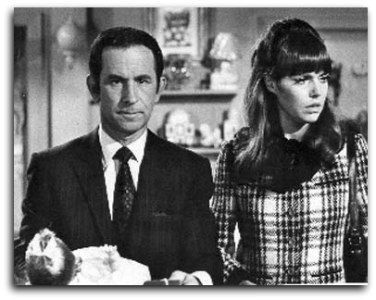
Don Adams (Maxwell Smart) and Barbara Feldon (Agent 99) in “Ironhand” (Oct. 3, 1969). Q – I remember that one – with “Colonel Kirby’s Tennessee Fricasseed Froglegs.” Another one of the episodes you scripted has been the subject of debate in the Get Smart fan community. Reportedly, Don Adams refused to star in “Ice Station Sigfried” as he felt the plot was just a reworking of a previous story, just in a different setting. This claim has baffled viewers as no one can figure which episode he was referring to. What’s the scoop on this episode, the only one Adams wasn’t in? The reason that Bill Dana starred in “Ice Station Siegfried” is that Don Adams had a terrible gambling habit, lost his ass in Vegas, and had to perform there for two weeks FREE for “the boys” or they might get angry. So the producers excused him for two weeks (one was a hiatus week anyhow) and Bill showed up, and all we had to do was change “86” to “Agent Quigley” or whatever his name became in the script. Q – When you came along, NBC cancelled the show before CBS picked it up for the fifth season. One of the changes was the birth of the twins, a move Buck Henry said later he’d have fought like a tiger. What did you think of this decision? Buck Henry was right. The idea of twins came from on high, and I’m not sure of the source, but let me hazard a guess – demographers who decided we were not getting enough viewers who were twins. Q – With Lloyd, you wrote the very last episode of Get Smart – “I Am Curiously Yellow.” That was the one in which, for one fleeting moment, Agent 86 was everything he pretended to be, mainly being actually smart. Did you know it was the finale for the show and did you do anything to “wrap up” the series? I didn’t think “I Am Curiously Yellow” was the last episode written (and I don’t remember writing it . . . but the records are notoriously poorly kept) and I doubt that anything was “wrapped up”. Q – Did the work you and Lloyd did for Get Smart lead to other work, as in writing for Allen Burnes when he produced Mary Tyler Moore? Get Smart put us on the map as a funny team and I’m sure it gave us credibility which led to other work. Knowing Allan Burns led to pitching to the brand new Mary Tyler Moore Show but wasn’t an assignment until we came up with a story that he and James Brooks couldn’t resist. For the first season, we came up with “Toulouse-Lautrec” as he was one of my favorite artists. We got the idea from watching poor Barbara Feldon on the Get Smart set trying (unsuccessfully) to appear shorter than Don Adams, standing around on her ankles, etc. The Mary Tyler Moore episode dealt with Mary being interested in a short guy (before she knew he was short) and finding out she was a height bigot. The episode won an Emmy for the director, Jay Sandrich. Mostly it was true that good work seemed to lead to other good work. Q – Did you keep up with any other Get Smart participants after the show left the air? I played golf with Don Adams a few times over the years but couldn’t, in fairness, say we were friends. The last time I saw him was at a Get Smart reunion party at a restaurant in Universal City in 2004, and I was saddened by his condition. He died about a year later. ~ Whitey Mitchell’s Work for Get Smart ~ Writer ~
Story Consultant ~
Thanks to Carl Berkmeyer for the series photos.
Gordon “Whitey” Mitchell’s book Hackensack to Hollywood: My Two Show Business Careers is available in bookstores everywhere, as well as these online merchants ~
BearManor Media
|